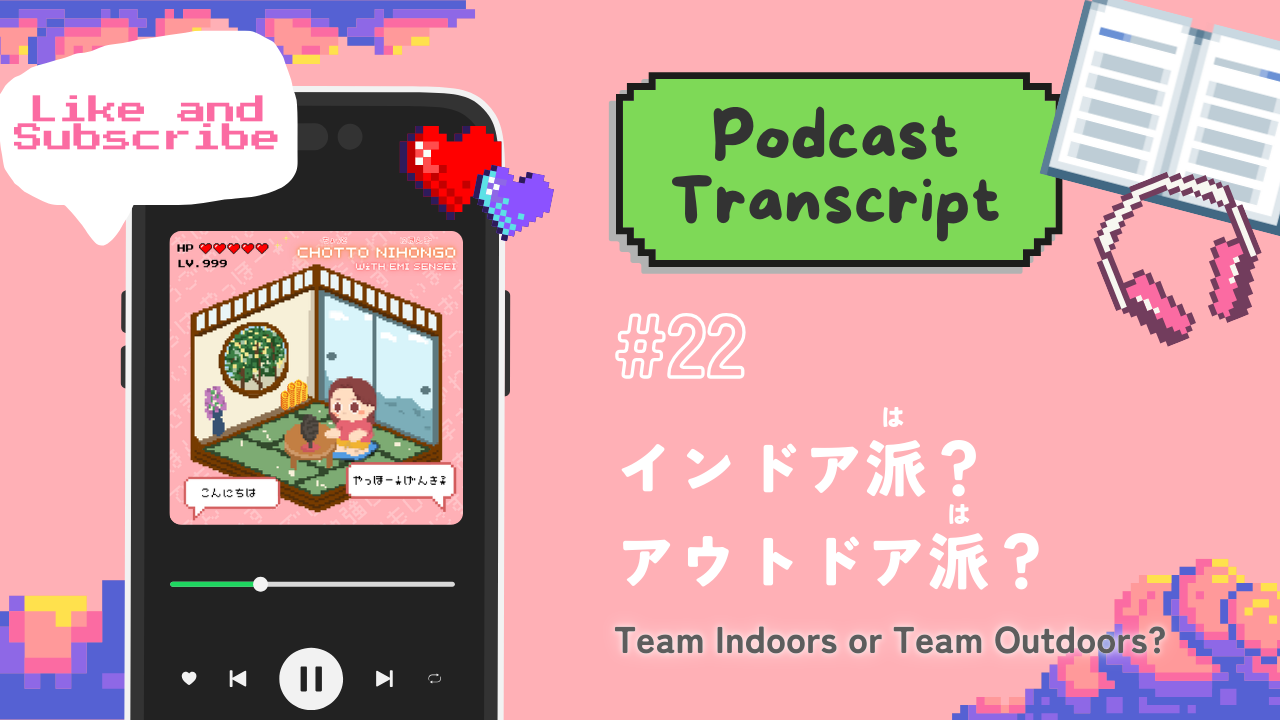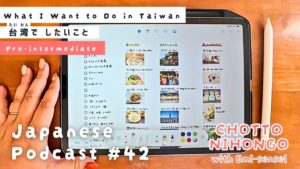おすすめの Google 拡張機能です!新しい言葉を勉強しましょう!
Here are the recommended Chrome extensions! Let’s learn new words here!
ポッドキャストプラットフォーム|Platforms of Podcast
こちらの記事は、配信中のポッドキャストのスクリプトです。
ぜひ、ポッドキャストを聞きながら読んでください。
 えみ先生
えみ先生もう聞いた人は、クイズをチェックしましょう!
ちょっとクイズ!|CHOTTO Quiz!
ポッドキャストを聞いた人は、ちょっとクイズを解いてみましょう。
むずかしいときは、下のスクリプトを読んで、もう一度クイズをチェックしてみてください。
【えいご】English Translation
Answer these quiz questions if you’ve listened to a new episode of my podcast.
If it was difficult, read the transcript below and try again.
❓ えみ先生は、学生のとき、インドア派でしたか?アウトドア派でしたか?|Was Emi-sensei an indoor type or outdoor type when she was a student?
えみ先生は、学生のときアウトドア派でした。暑い日でも、外に遊びに行っていました。
Emi-sensei was an outdoor person when she was a student. She would go out even on hot days.
❓ えみ先生は、どうして大阪に住んでいたとき、あまり外に出ませんでしたか?|Why did Emi-sensei not go out when she was in Osaka?
友だちが まだ少なかったので、外で遊びませんでした。
Emi-sensei didn’t really go out because she didn’t have many friends yet.
❓ えみ先生は、今 インドア派ですか?アウトドア派ですか?|Is Emi-sensei an indoor person or outdoor person now?
今は、どちらかというと、インドア派です。でも、友だちと遊ぶのも好きです!
If I had to choose, I would be an indoor type. But I really like going out with friends!
ポッドキャストのスクリプト|Transcript of Podcast
エピソード22、「インドア派?アウトドア派?」
このポッドキャストは、初中級(Pre-Intermediate)レベルです。
おはようございます。こんにちは。こんばんは。
日本語の先生、エミです。
最近、天気がすこし悪くなっています。
日本の南、沖縄と九州エリアは梅雨に入ったみたいです。
【えいご】English Translation
Good morning. Hello. Good afternoon.
I am a Japanese teacher, Emi.
Recently, the weather has gotten a little worse.
It seems that the southern part of Japan—Okinawa and Kyushu—has entered the rainy season.
梅雨は、雨の日がつづく季節のことです。
日本は、だいたい5月の終わりから7月のはじめくらいまで梅雨で、よく雨が降っています。
日本の中でも、沖縄はいちばん早く梅雨になります。
でも、日本の一番北、寒いところの北海道は梅雨がないそうです。
知っていましたか?
私は北海道に行ったことがないので、わかりません。
でも調べてみたら、北海道に梅雨はないという記事を見ました。
【えいご】English Translation
The rainy season is a season when rainy days continue.
In Japan, the rainy season is usually from around the end of May to the beginning of July, and it rains a lot.
Even within Japan, Okinawa is the first place that the rainy season starts.
But in the far north of Japan, in the cold region, Hokkaido, there is apparently no rainy season.
Did you know that?
I’ve never been to Hokkaido, so I don’t know about it (I cannot guarantee).
But when I looked it up, I saw an article that said there is no rainy season in Hokkaido.
毎日ジメジメしていて、外に出るのがちょっといやになりますね。
みなさんの地域はどうですか?
天気がいいですか?悪いですか?
どんな天気か教えてください。
【えいご】English Translation
It feels damp every day, and it makes you not want to go outside, doesn’t it?
How is the weather in your area?
Is it good? Is it bad?
Please tell me what the weather is like.
ここで先週の質問をチェックしましょう。
先週は こんな質問をしました。
「休みの日は家でゆっくりしたいですか?
それとも外に出たいですか?」
こんな質問でした。
【えいご】English Translation
Alright, now let’s check last week’s question.
Last week, I asked this question:
“Do you want to relax at home on your day off?
Or do you want to go out?”
That was the question.
みなさんはどうですか?
私は、学生の時と、今、ちょっとちがいます。
今日はこのテーマについて話します。
【えいご】English Translation
How about you all?
I’m a little different now compared to when I was a student.
Today, I’ll talk about this theme.
まずは、言葉のチェックです。
先週の質問のとき、すこし話しました。
インドア派とアウトドア派。
「〇〇派」は、AとBどっちが好き?という時に使います。
Aが好きだからA派、Bが好きだからB派。
こんな感じで使います。
インドア派は、家でゆっくりするのが好きな人。
たとえば、家で映画を見たり、本を読んだりするのが好きな人です。
アウトドア派は、外で遊ぶのが好きな人。
たとえば、ハイキングやキャンプ、散歩が好きな人です。
みなさんはインドア派ですか?
アウトドア派ですか?
【えいご】English Translation
First, let’s check the vocabulary.
I talked a little about this when I asked last week’s question.
Team Indoors and Team Outdoors.
We use “〇〇-type (/Team 〇〇)” when asking whether you like A or B.
If you like A, you’re A-ha (the A type). If you like B, you’re B-ha (the B type.)
That’s how we use it.
An “indoor type” is someone who likes to relax at home.
For example, people who like to watch movies or read books at home.
An “outdoor type” is someone who likes to play outside.
For example, people who like hiking, camping, or going for walks.
Are you an indoor type? Or an outdoor type?
私は、学生のときはアウトドア派でした。
高校生のときと大学生のときは、毎週末 友達と遊びに行っていました。
カフェに行ったり、買い物に行ったり、公園に行ったりして、外にいることがおおかったです。
暑い日でも、友達とよく出かけていました。
【えいご】English Translation
When I was a student, I was an outdoor type.
When I was in high school and college, I went out with my friends every weekend.
We went to cafés, went shopping, went to parks, and spent a lot of time outside.
Even on hot days, I often went out with friends.
でも、仕事を始めてからちょっと変わりました。
大学を卒業したあと、私は地元の沖縄から出て、大阪で仕事を始めました。
地元はhometownという意味です。
私の地元は沖縄です。
沖縄を出たあと大阪に行きましたが、大阪にはまだ友達がすくなかったので、あまり外で遊ばなくなりました。
【えいご】English Translation
But after I started working, it has changed a bit.
After graduating from university, I left my hometown, Okinawa, and started working in Osaka.
“Jimoto” means hometown.
And my jimoto (hometown) is Okinawa.
After I left Okinawa, I went to Osaka, but I didn’t have many friends there yet, so I didn’t go out much.
会社の同期…、同期は同じ年に会社に入った人のことです。
会社の同期とご飯に行ったり、バーベキューに行ったりすることもありましたが、毎週ではありませんでした。
そのかわり、家でドラマを見たり、アニメを見たりするようになりました。
私の家にはテレビはなかったんですけど、映画やアニメを大きい画面で見たかったので、ホームシアターができるプロジェクターを買いました。
すこし高かったですけど、楽しく映画を見ることができました。
【えいご】English Translation
With my dōki—which means people who joined the company the same year (coworkers,) I sometimes went to dinner or had barbecues.
But it wasn’t every week.
Instead, I started watching dramas and anime at home.
My home didn’t have a TV, but I wanted to watch movies and anime on a big screen, so I bought a projector to create a home theater.
It was a little expensive, but I could enjoy watching movies.
大阪で仕事をしたあと、私は沖縄にもどって別の仕事をしました。
地元に帰ると、むかしからの友達がたくさんいます。
みんな「遊ぼう!」と誘ってくれるので、沖縄に帰ったあと、またアウトドア派になりました。
友達と友達の子供と公園で遊んだり、カフェに行ったりして楽しく過ごしました。
【えいご】English Translation
After working in Osaka, I returned to Okinawa and started a different job.
When I went back to my Jimoto (hometown), I had many friends from the past.
They invited me to hang out a lot, so after returning to Okinawa, I became an outdoor type again.
I played in parks with friends and their children, went to cafés, and had a good time.
でも、26歳のとき結婚をして、また沖縄から出ました。
今は家で仕事をしています。全然 外に出ません。
だから またインドア派になりました。
でも、友達に誘われると とても嬉しいです。
誘われたときは、外に出て遊んでいます。
【えいご】English Translation
But when I was 26, I got married and left Okinawa again.
Now I work from home. I don’t go out at all.
So I’ve become an indoor type again.
But when friends invite me, I’m very happy (to go out).
When they invite me, I go out and have fun.
1人でもレッスンが朝だけの日や、オフの日は歩いて 1時間のカフェまで行って、そこで すこしレッスンの準備をすることもあります。
今の私は、どちらかというとインドア派です。
でも、友達と遊ぶのは大好きです。
1人で遊ぶより、友達と遊ぶほうが好きなんです。
【えいご】English Translation
Even when I’m alone—if my lessons are only in the morning or if it’s a day off—I sometimes walk to a café an hour away and prepare lessons there.
Now, I’m more of an indoor type.
But I love hanging out with friends.
I like going out with friends more than going out alone.
みなさんはどうですか?
1人で何かをする方が好きですか?
友達と遊ぶ方が好きですか?
【えいご】English Translation
How about you all?
Do you prefer doing things alone?
Or do you prefer hanging out with friends?
では、今日も みなさんに 質問があります。
「みなさんのおすすめの『暇つぶし』は何ですか?」
「暇つぶし」この言葉、知っていますか?
暇は、「暇です。」「暇じゃないです。」の暇ですね。
暇は、いそがしくないときです。
何もしていないとき、やることがないとき、暇です。
「つぶし」は、つぶしますという動詞からきています。
英語ではcrashとかkillの意味です。
暇つぶしは、何もすることがない時に何かをして時間を過ごすことです。
【えいご】English Translation
Now, I have a question for you today as always.
“What is your recommended way for Hima-Tsubushi (to kill time)?”
Do you know the word “hima-tsubushi”?
“Hima” is the same as in “I’m free” or “I’m not free.”
It means the time when you’re not busy.
When you’re not doing anything, when you have nothing to do, that’s “hima.”
“Tubushi” comes from the verb “tsubushimasu.”
In English, it’s like “kill” in “kill time.”
“Hima-tsubushi” is doing something when you have nothing to do to pass the time
たとえば、今日は1時から友達と会うけど、12時に公園に着いてしまいました。
暇です。
暇つぶしで公園を散歩します。
時間がありますから、その時間まで何かをして待ちます。
これが暇つぶしです。
【えいご】English Translation
For example, you’re meeting a friend at 1:00 p.m., but you arrive at the park at 12:00.
You’re free (having nothing to do).
So you walk around the park to kill time.
Because you have (free) time, you do something to wait until then.
That’s “hima-tsubushi.”
みなさんは暇つぶしで何をしますか?
家にいるときはどうですか?
外にいるときは違うことをしますか?
ぜひ、コメントで教えてください。
【えいご】English Translation
What do you do to kill time?
What about when you’re at home?
Do you do different things when you’re outside?
Please tell me in the comments.
今日のポッドキャストのスクリプトは、私のウェブサイトにあります。
ウェブサイトは、 en-nihongo.com です。
よかったら、ポッドキャストの感想や、質問の答えをコメントで教えてください!
じゃあ、また来週のポッドキャストで会いましょう。
じゃあね~!
【えいご】English Translation
A transcript for today’s podcast is on my website.
The website is en-nihongo.com .
I’d be very happy if you could share your thoughts/impressions or could answer the question I asked in this episode!
I’ll see you in the next episode.
Jaa ne-!







コメント|Comment